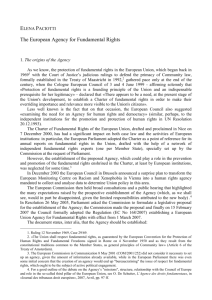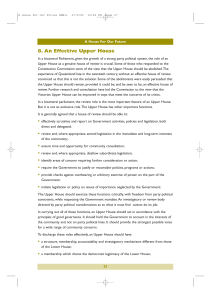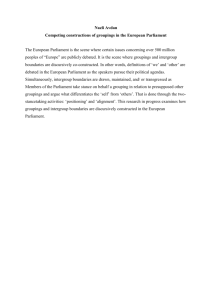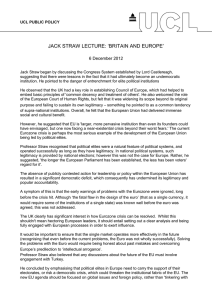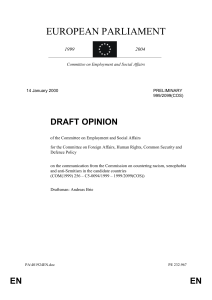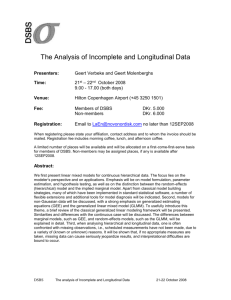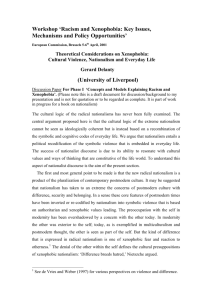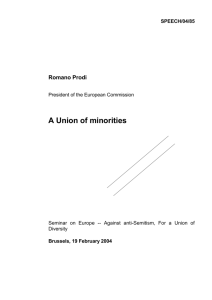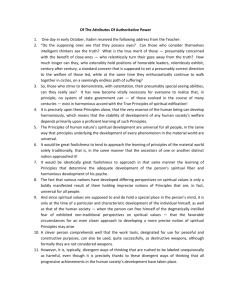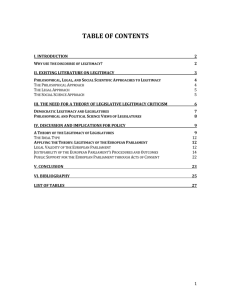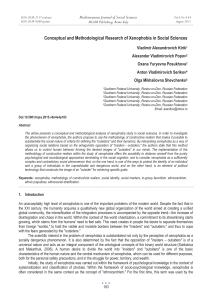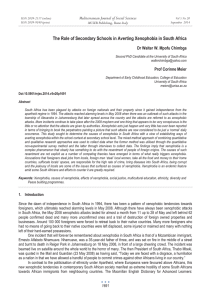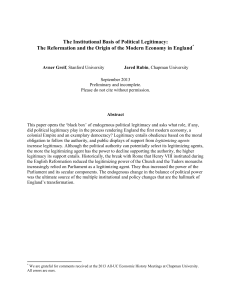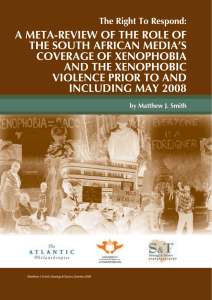1 KATHOLIEKE UNIVERSITEIT LEUVEN Contribution to the
advertisement
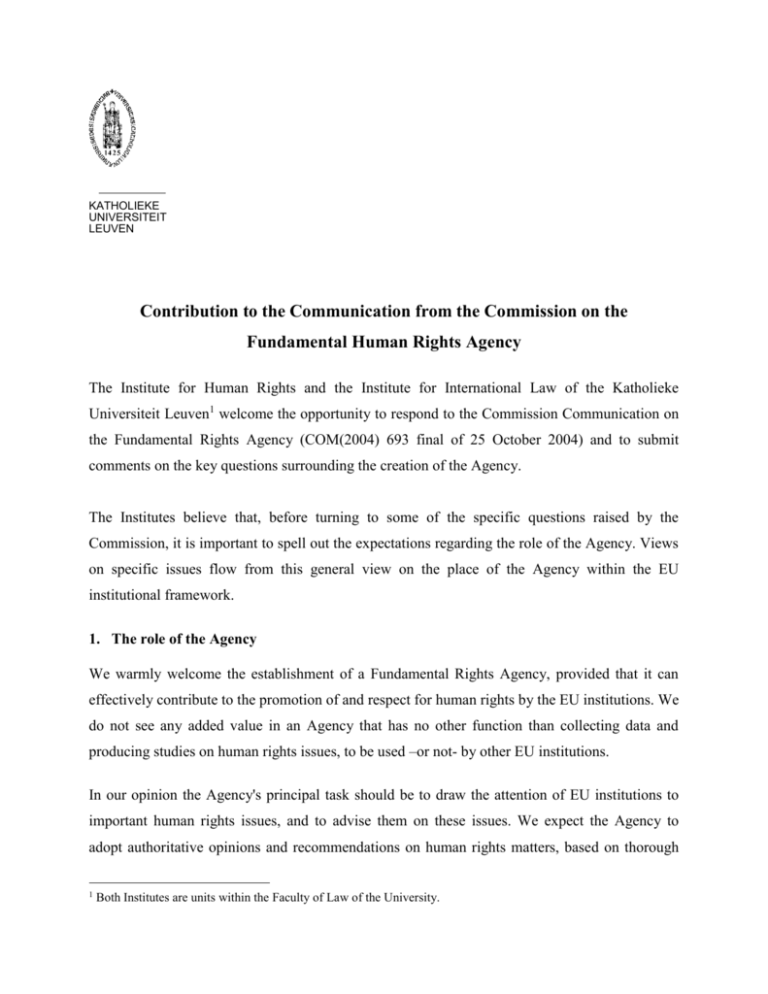
KATHOLIEKE UNIVERSITEIT LEUVEN Contribution to the Communication from the Commission on the Fundamental Human Rights Agency The Institute for Human Rights and the Institute for International Law of the Katholieke Universiteit Leuven1 welcome the opportunity to respond to the Commission Communication on the Fundamental Rights Agency (COM(2004) 693 final of 25 October 2004) and to submit comments on the key questions surrounding the creation of the Agency. The Institutes believe that, before turning to some of the specific questions raised by the Commission, it is important to spell out the expectations regarding the role of the Agency. Views on specific issues flow from this general view on the place of the Agency within the EU institutional framework. 1. The role of the Agency We warmly welcome the establishment of a Fundamental Rights Agency, provided that it can effectively contribute to the promotion of and respect for human rights by the EU institutions. We do not see any added value in an Agency that has no other function than collecting data and producing studies on human rights issues, to be used –or not- by other EU institutions. In our opinion the Agency's principal task should be to draw the attention of EU institutions to important human rights issues, and to advise them on these issues. We expect the Agency to adopt authoritative opinions and recommendations on human rights matters, based on thorough 1 Both Institutes are units within the Faculty of Law of the University. 2 research, but containing also a strong policy element. The work of the Agency should not be limited to looking at draft legislation from a purely legal or academic point of view. The search for the best way to promote and to respect human rights often implies a reconciliation of competing interests. This is ultimately the responsibility of the competent institutions. A Fundamental Rights Agency could, however, offer useful guidance in this respect. There are more and more EU decisions in fields that are relevant for the fundamental rights of citizens in Europe and beyond, and there is sometimes a real need for a specific attention for the impact on these rights before the decision is taken and afterwards. This task should be the very raison d'être of the Agency. We therefore do not think, as seems to be implicit in the Commission Communication, that the Agency should in the first place collect and analyse data, and only in the second place give its opinions and views on certain matters. It should not be a database. In our opinion, the collection and analysis of objective, reliable and comparable data is only a means to achieve the specific goal of giving guidance to the EU institutions on how to best take human rights into account in the shaping of their internal and external policies. 2. Some other comments a) As to the Agency's field of action Due regard should be given to the principle of subsidiarity and to the fact that other bodies are already operating at international and national level. The authoritative views of the Agency should thus “complement the Community system of protecting and promoting existing fundamental rights” (Communication of the Commission, pages 5-6, no. 2.1). The Agency's remit can therefore in principle best be confined to the scope of Community (or Union) law, including the latter’s external (non-EU) dimension. Its role would be to help ensure compliance with fundamental rights of both EU laws and policies and implementation of the latter by Member States (cf. Article 6 TEU). However, this should not preclude the possibility for the Agency to monitor serious cases of human rights violations in a Member State, with the purpose of assisting EU bodies. It should be possible for the Commission or the European Parliament to ask for an advisory opinion of the 3 Agency whenever there appears to be a serious human rights violation in a Member State. Indeed the Commission or the European Parliament must be able to assess whether there is "a clear risk of a serious breach by a Member State of principles mentioned in Article 6 (1)" (Article 7 (1) TEU). The Agency could assist those organs with its authoritative views on the matter. Given the highly delicate nature of the issue, an opinion could be particularly useful. The report of Messrs. Ahtisaari, Frowein and Oreja on the situation in Austria in 2000 could serve as a good example of such assistance. b) Rights and thematic areas to be covered Given the fact that the Agency should enlighten the EU institutions as to how offer a better protection of human rights within the EU, it seems that the Agency is best placed to set priorities itself. We do not think that the Agency’s mandate should be limited a priori by confining it to only certain rights included in the Charter of Fundamental Rights. Such limitation would make it difficult for the Agency, and ultimately for the EU institutions, to consider all human rights in their indivisibility. We would also like to stress that, although the Agency is to be built upon the existing European Monitoring Centre on Racism and Xenophobia, its mandate should not be limited to racism and xenophobia and a few related areas. It can be expected, however, that racism and xenophobia will remain a priority of the Agency. c) Geographic Scope As stated above, the Agency should only be preoccupied by the actions of the institutions, bodies and agencies of the Union and the actions of the Member States when they are implementing Union law. All efforts must be aimed at guaranteeing respect for human rights within the EU. Therefore it seems that the remit of the Agency should not be extended to third countries. There are also practical reasons for such limitation. To require an Agency to give policy recommendations on matters relating to the human rights situation in third countries would require a specific expertise to be developed in the Agency. Although this may be a laudable long- 4 term objective, it seems better, at least for the time being, to concentrate the expertise on respect for human rights in and by the EU and its Member States. This being said, as indicated above, Community and Union law increasingly have important external dimensions: through the multitude of international agreements it concludes, the external economic relations it develops via both autonomous and conventional trade measures, its participation in the works of the global multilateral organisations (from the UN family to the WTO) and in global international conferences, and through the measures adopted in the context of the gradually unfolding common foreign, security and defence policy, the EU is ever more becoming a global actor. In all of its external actions, the EU also badly needs the sound and independent advice on human rights aspects from the Agency. It would indeed be unthinkable that the respect for human rights by the EU would only be a matter for the “forum internum” but not for the “forum externum”. This would, besides, be in flat contradiction with both the current EU constitutional setting and the Treaty establishing a Constitution for Europe. d) Structure of the Agency The structure of the Agency should reflect the need for independence and pluralist representation, as spelled out in the Paris Principles relating to the status for national institutions for the promotion and protection of human rights. Independence, in human rights matters, needs no further justification. The representative character of the board of the Agency is necessary if it is intended to give policy recommendations. It cannot do so in a credible way if its composition does not reflect the broad spectre of convictions and beliefs in European society. It is also important that such Agency has a strong legitimacy. Although we know that the managing boards of agencies, in the EU context, are generally composed of individuals appointed by the Member States, it seems to us that there is here a role for the European Parliament. The Parliament, by electing the members, would give them a strong legitimacy, and could at the same time provide for the pluralist representation within the Agency. Furthermore, in order to ensure confidence of the public in the Agency, a transparent and public selection procedure is needed, based on the human rights expertise of the persons concerned. 5 An alternative might be to establish a direct link between the Agency and bodies with the same functions at the national level. Members of national human rights institutions could thus be appointed by these institutions as their representatives in the EU Agency. There should also be a link with the relevant international organisations, such as the Council of Europe. At the least, the Council of Europe Commissioner for Human Rights (or a representative) should be able to take part in the activities of the Agency. The Agency’s legitimacy, and accountability, should moreover be assured through periodic obligations of reporting and a transparent mode of operation. Leuven, 17 December 2004
